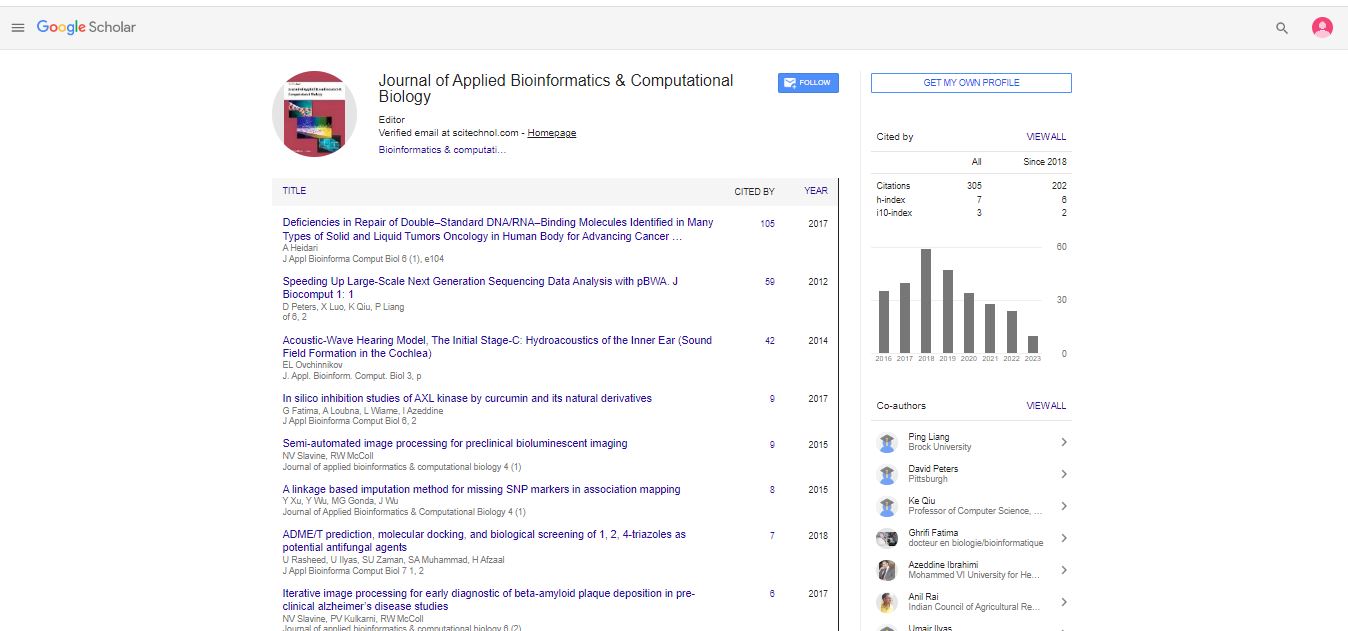Short Communication, Vol: 12 Issue: 4
Translating Genomic Discoveries into Clinical Applications: Role of Computational Biology
Lucien Mary*
1Department of Precision Health, Luxembourg Institute of Health, Strassen, Luxembourg
*Corresponding Author: Lucien Mary,
Department of Precision Health, Luxembourg
Institute of Health, Strassen, Luxembourg
E-mail: LucienHoffbeck@lih.lu
Received date: 31 July, 2023, Manuscript No. JABCB-23-114569;
Editor assigned date: 02 August, 2023, Pre QC No. JABCB-23-114569 (PQ);
Reviewed date: 16 August, 2023, QC No. JABCB-23-114569;
Revised date: 23 August, 2023, Manuscript No. JABCB-23-114569 (R);
Published date: 30 August, 2023, DOI: 10.4172/2327-4360.1000274
Citation: Mary L (2023) Translating Genomic Discoveries into Clinical Applications: Role of Computational Biology. J Appl Bioinforma Comput Biol 12:4.
Description
In the feild of modern medicine, one of the most transformative developments in recent years has been the integration of genomics into clinical practice. Genomic research has a wealth of information about the genetic underpinnings of diseases, opening doors to personalized medicine and targeted therapies. However, there are several obstacles in the path from genetic discovery to clinical application, and computational biology is essential in bridging this gap. This essay explores the significance of computational biology in translating genomic discoveries into practical clinical applications, highlighting its role in data analysis, biomarker identification, drug discovery, and patient management.
The creation of enormous datasets that frequently contain DNA sequences, gene expression patterns, and differences in genomic structure. Utilising computational approaches is necessary for the complicated and resource-intensive process of analysing big databases. The tools and methods required to unlock the information concealed within these datasets are provided by computational biology. Computational biologists can find genetic changes linked to illnesses by using methods like sequence alignment, variant calling, and gene expression profiling, providing the clinical applications [1].
The Human Genome Project, which accurately sequenced the entire human genome, is one of the significant in this area. The project's computer techniques played a crucial role in organizing and deciphering the vast volume of genetic data. This monumental effort laid the groundwork for subsequent genomic research and personalized medicine. One of the primary goals of genomic research is to identify biomarkers, specific genetic variations or molecular signatures that are associated with disease susceptibility or treatment response. Computational biology plays a critical role in the identification of these biomarkers by comparing the genomic profiles of healthy and affected individuals [2].
For instance, in cancer research, computational tools can analyze the genomic data of tumor samples to identify driver mutations and potential therapeutic targets. These biomarkers allow clinicians to treat the individual patients, increasing the chances of success and minimizing side effects [3]. This precision medicine approach has revolutionized cancer care, leading to improved patient outcomes. Translating genomic discoveries into novel therapies is a complex and time-consuming process. Computational biology expedites drug discovery by aiding in the identification of potential drug targets and the design of new molecules. Target identification involves analyzing genomic data to pinpoint genes or proteins that play a critical role in disease pathways. Once identified, these targets can serve as the basis for drug development efforts.
Additionally, computational methods such as molecular modeling and virtual screening enable researchers to design and test thousands of drug candidates in silico, significantly reducing the time and resources required for preclinical drug development. This not only expedites the drug discovery process but also increases the chances of identifying effective treatments for previously untreatable diseases. The integration of genomic information into clinical practice is transforming patient management. Computational biology plays a pivotal role in interpreting an individual's genetic data to guide clinical decisions. Genetic testing can reveal an individual's susceptibility to certain diseases, allowing for early intervention and personalized prevention strategies [4].
Furthermore, pharmacogenomics, a field that studies how genetic variations affect drug responses, enables clinicians to select the most effective and safe treatments for patients based on their genetic profiles. This tailored approach minimizes adverse drug reactions and optimizes treatment outcomes. While computational biology has significantly advanced the translation of genomic discoveries into clinical applications, several challenges persist. Managing and analyzing the vast amount of genomic data generated requires robust computational infrastructure and expertise.
Furthermore, the ethical and privacy considerations surrounding the use of genetic information must be carefully addressed to ensure patient trust and data security. Looking ahead, the field of computational biology is poised for continued growth and innovation. Machine learning and artificial intelligence are increasingly being applied to genomic data analysis, enabling the discovery of subtle patterns and associations that were previously undetectable. Additionally, advancements in high-throughput sequencing technologies to generate even more comprehensive genomic data, further expanding the opportunities for clinical applications [5-8].
Translating genomic discoveries into clinical applications represents a transformative leap in modern medicine. Computational biology plays a central role in this journey by providing the tools and techniques necessary for data analysis, biomarker identification, drug discovery, and patient management [9]. Through the integration of genomic information into clinical practice, healthcare is becoming more personalized and precise, offering the potential for improved patient outcomes and a deeper understanding of disease mechanisms. While challenges remain, the future of genomic medicine is bright, and computational biology will continue to be at the forefront of this transformative field [10].
References
- Feinstein AR (1977) Clinical biostatistics. Clin Pharmacol Ther 22(4): 485-98
- Chan YH. (2003) Biostatistics 104: correlational analysis. Singapore Med J 44(12): 614-9
- Chan YH. (2003) Biostatistics 101: correlational analysis. Singapore Med J 44(12): 614-9
- Reiczigel J, Marozzi M, Fabian I, Rozsa L (2019) Biostatistics for parasitologists–a primer to quantitative parasitology. Trends Parasitol. 35(4): 277-81
- Overholser BR, Sowinski KM (2008) Biostatistics primer: part 2. Nutr Clin Prac 23(1): 76-84
- Simpson JA (1971) Bancroft's introduction to biostatistics. J. Neurol. Neurosurg. Psychiatry. 34(2): 208
- Chan YH. (2003) Biostatistics 202: correlational analysis. Singapore Med J 44(12): 614-9
- Chakrabarty D (2019) Association of statistics with biostatistics research. Biom. biostat. int. Biometrics 8(3): 104-9
- Glantz SA (1980) Biostatistics: how to detect, correct and prevent errors in the medical literature. Circulation 61(1): 1-7
- Breslow N (1990) Biostatistics and bayes. Stat Sci 5(3): 269-84
 Spanish
Spanish  Chinese
Chinese  Russian
Russian  German
German  French
French  Japanese
Japanese  Portuguese
Portuguese  Hindi
Hindi 
